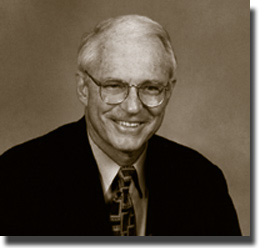The first wave of specialists to Greenville
brought doctors in what were then little-known disciplines. Soon, the community
knew it could count on these physicians to bring badly needed services to
the rural east.
![]() Among
them was Donald Tucker, M.D., a cardiologist and founding member of Quadrangle
Internal Medicine. He never planned to establish one of the largest group
practices in the east, yet Quadrangle Internal became Quadrangle Medical Specialists
and later Physicians East.
Among
them was Donald Tucker, M.D., a cardiologist and founding member of Quadrangle
Internal Medicine. He never planned to establish one of the largest group
practices in the east, yet Quadrangle Internal became Quadrangle Medical Specialists
and later Physicians East.
![]() He
may not have planned to become a spokesman for the private practice community,
but his voice has resounded through many difficult debates involving the relationship
between physicians in the community and in the school of medicine.
He
may not have planned to become a spokesman for the private practice community,
but his voice has resounded through many difficult debates involving the relationship
between physicians in the community and in the school of medicine.
A Greenville native, he attended Duke University, where he completed his residency
and a fellowship in cardiology in 1962. He arrived in Greenville with a desire
to practice.
![]() "I
think the community and the environment were ripe for multispecialty clinics,"
he says. "We were trying to reduce expenses and give a better product
by combining services. It's better to have all of your services grouped into
one building, and to have your own management."
"I
think the community and the environment were ripe for multispecialty clinics,"
he says. "We were trying to reduce expenses and give a better product
by combining services. It's better to have all of your services grouped into
one building, and to have your own management."
![]() From
the beginning discussions of creating a medical school, he has spoken fervently
about the need to preserve the autonomy of physicians not associated with
the academic center.
From
the beginning discussions of creating a medical school, he has spoken fervently
about the need to preserve the autonomy of physicians not associated with
the academic center.
![]() "I
think there was concern by people in private practice about the hospital's
relationship with the medical school, and the feeling that private practice
could be left out in this relationship," he says.
"I
think there was concern by people in private practice about the hospital's
relationship with the medical school, and the feeling that private practice
could be left out in this relationship," he says.
![]() He
agrees the medical school helped promote advancements and the availability
of specialized services, but notes that many specialists already practiced
here prior to 1977.
He
agrees the medical school helped promote advancements and the availability
of specialized services, but notes that many specialists already practiced
here prior to 1977.
![]() "Most
people give credit for the growth in the medical community in Greenville to
the medical school, which I think is unfair and unfortunate. This was a growing,
vital medical community before the medical school arrived."
"Most
people give credit for the growth in the medical community in Greenville to
the medical school, which I think is unfair and unfortunate. This was a growing,
vital medical community before the medical school arrived."
![]() His
experience reflects a staff doctor's demanding schedule: He remembers having
to perform emergency room duties once every 25 days. "It was difficult
because you worked all day and then you were at the hospital and you worked
all night and slept very little."
His
experience reflects a staff doctor's demanding schedule: He remembers having
to perform emergency room duties once every 25 days. "It was difficult
because you worked all day and then you were at the hospital and you worked
all night and slept very little."
![]() While
he agrees that the hospital - with its expanse, its equipment and its services
- is an advantage to the area, he believes it has also been expensive for
the patient. "There was a group of us who tried very hard to get a Certificate
of Need for a private hospital," he says. "Most of us felt like
the citizens would be better served by having a choice."
While
he agrees that the hospital - with its expanse, its equipment and its services
- is an advantage to the area, he believes it has also been expensive for
the patient. "There was a group of us who tried very hard to get a Certificate
of Need for a private hospital," he says. "Most of us felt like
the citizens would be better served by having a choice."
![]() His
participation gave a strong voice to concerns of cost, effectiveness and focus.
He kept the maxim "Better - not bigger" in the public debate.
His
participation gave a strong voice to concerns of cost, effectiveness and focus.
He kept the maxim "Better - not bigger" in the public debate.
![]() "I
went into medicine not to make a fortune, but to provide a service that was
essential to improve the welfare of the community," he says. "Medicine
is not as personalized as it was and a hospital is not as personalized as
it was and I think it is a big challenge for the future."
"I
went into medicine not to make a fortune, but to provide a service that was
essential to improve the welfare of the community," he says. "Medicine
is not as personalized as it was and a hospital is not as personalized as
it was and I think it is a big challenge for the future."

Don Tucker, MD
The Brody School of Medicine at East Carolina University
600 Moye Boulevard
Greenville, North Carolina 27858-4354
P 252.744.2240 l F 252.744.2672